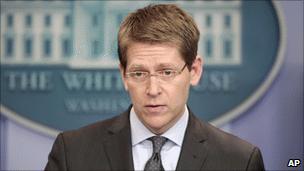US House passes two-week stop-gap budget
- Published

White House spokesman Jay Carney said Washington should focus on a long-term budget deal
The US House of Representatives has approved a measure to fund the US government for a further two weeks, avoiding a looming shut-down.
The bill from the Republican-led chamber would cut government spending by $4bn (£2.45bn) in that period.
It now goes to the US Senate, which has said it will pass the bill.
Funding for government operations was set to expire on Friday, as Democrats and Republicans have been unable to agree on a budget.
The bill passed in a 335-91 bipartisan vote.
It cuts into programmes that President Barack Obama had already proposed eliminating or trimming and opens a window of time for White House officials and Republican and Democratic leaders to negotiate on a budget to keep the government running until the end of the fiscal year on 30 September.
Economic impact
"We'll pass this and then look at funding the government on a long-term basis," Democratic Senate Leader Harry Reid of Nevada said on Tuesday.
At the White House, spokesman Jay Carney called on congressional leaders to approve a longer-term budget rather than keep negotiating a series of two-week budget deals.
"We do not believe would be helpful - in fact, we believe it would be harmful to the economy, and therefore, not something the American people would support - if we created a tollbooth where we are negotiating again and again on continuing resolutions to fund the government for two weeks or another short-term period," he said.
Republicans had been pressing for much more severe cuts, passing a bill last month that would have sliced $61bn from the federal budget by the end of the fiscal year.
But Democrats in the US Senate opposed that measure and Mr Obama vowed to veto it, saying the cuts would hinder economic growth and slash education, research and infrastructure spending too far.
Slashing spending
Republicans took control of the US House of Representatives in the November elections amid dissatisfaction with Democrats' handling of the economy.
The US budget deficit is expected to reach $1.5 trillion in the current fiscal year, and the Republican Party has said it has a mandate to balance the budget by slashing spending dramatically without raising taxes.
Both Democrats and Republicans say they are keen to avoid the government shutting down.
A federal shut-down - last seen in 1996 - would lead to hundreds of thousands of workers being forced to take unpaid leave and halt operations ranging from the processing of passport applications to providing healthcare for veterans.
- Published26 February 2011